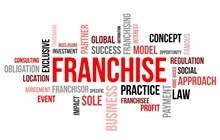
Top stories

Marketing & MediaWarner Bros. was “nice to have” but not at any price, says Netflix
Karabo Ledwaba 6 hours





More news


















Growing local opportunities and international operators looking to South Africa to provide a springboard for their franchise operations into Africa are pushing increased activity in the competitive franchising sector. Although there has been an increase in the number of international brands entering the South African market, locally born franchises still dominate.
More than 88% of franchise brands in South Africa have been developed here, the majority since 1992, with the remaining 12% being accounted for by international brands. These international brands are represented primarily by quick service restaurants.
The presence of international brands has increased by about 3.4% in the last three years as franchisors have entered South Africa with the intention of using the country as a gateway to Africa.
The bank commissioned Franchize Directions to research the industry in 2013 and this has identified the following major trends impacting on the sustainability and growth of franchising in South Africa:
Looking into Africa
The growth of franchises in Africa has been dramatic. Three years ago, 138 franchised systems were operating on the continent - a number that increased to 182 last year. Taking advantage of gaps in various markets has seen growth in sectors ranging from automotive services, business-to-business services, fast food to retail operations.
Although franchises are streaming into Africa, South Africa still leads the pack of the 'top 10 franchise countries' on the continent. Ranked in order of their franchise appeal these countries are:
South African franchisors are very active with just over 32% having expanded operations into the continent. The range of franchises is very broad, being dependent on perceived consumer demand in various markets, and the growing strength of the middle class in select markets.
The African Development Bank has estimated that 326 million people make up the middleclass in Africa. It estimates that African consumers will spend US $2.2 trillion on goods and services by 2030. Given that Africa is presently home to seven of the 10 fastest growing economies on the globe, continued expansion into Africa and further growth of this crucial consumer sector, can be anticipated.
Looking forward, it can be said with confidence that franchising has a major role to play within the South African economy. The sector will continue to expand and offer significant employment prospects for thousands of South Africans. Africa, characterised by explosive growth of the middle class, will offer unrivalled future opportunities for local and internationally-based franchisors.